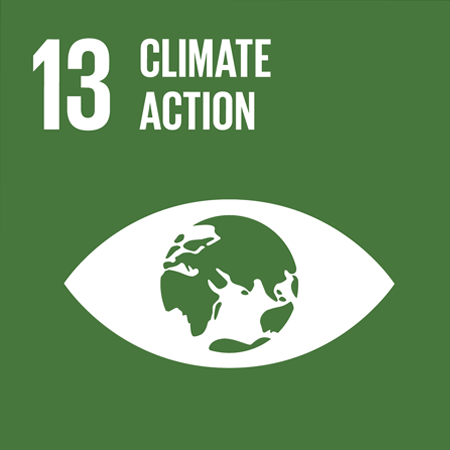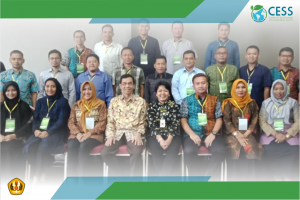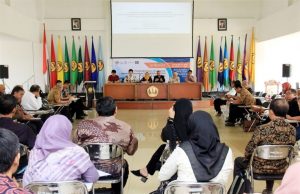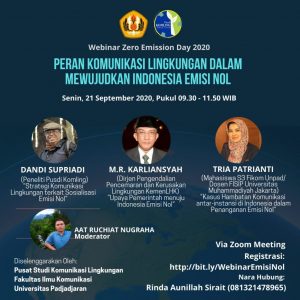
SDG 13: CLIMATE ACTION
This goal specifically has 3 targets, namely: (i) strengthening resilience and adaptive capacity to disasters related to climate and natural disasters; (ii) integrating climate change mitigation measures into national policies, strategies and plans; and (iii) improving education, awareness and human and institutional capacity for mitigation, adaptation, impact reduction and early warning on climate change. This target strengthens the climate change agreement which has global quantitative targets, starting with the Kyoto Protocol to reduce global warming until 2020, followed by the Paris Agreement to control global warming after 2030. Through Goal 13, countries are encouraged to immediately integrate climate change management. into national development, so that other Goals in the SDGs are maintained, so that sustainable development is not disrupted by the impacts of climate change.
Low carbon energy use
Environmental education measures
- Low-Carbon tracking
Universitas Padjadjaran Total Carbon Footprint
In 2021 Padjadajaran University produced a total carbon emission of 3561.96 metric tons. This decrease in the
amount of carbon production is also due to the change in the system to online learning during the pandemic. The largest carbon footprint comes from the use of electricity of 3164 and the second highest contributor to
carbon emissions is motorbikes as much as 449.2
- Local education programmes on climate
- Climate Action Plan, shared
- Co-operative planning for climate change disasters
- Inform and support government
- Environmental education collaborate with NGOs
1)Training about environment and sustainability
Unpad has Center of Environment and Sustainability (CESS) that actively provides training about environment and sustainability

One of the government’s policies in adapting and mitigating climate change is by issuing a Presidential Regulation on the National Action Plan for Reducing Greenhouse Gas Emissions (RAN-GRK) and preparing the National Action Plan for Climate Change Adaptation (RAN-API). Policy implementation will be successful if it is accompanied by its derivative policies at the regional level, namely the Regional Action Plan for Reducing Greenhouse Gases (RAD-GRK) and the Regional Action Plan for Climate Change Adaptation (RAD-API). The Center for Environmental Excellence and Sustainability Sciences, Universitas Padjadjaran together with the Unpad Graduate School in collaboration with the Center for Development, Education and Training of Planners – the National Development Planning Agency (Kapusbindiklatren – Bappenas) carries out Non-Degree Education and Training on Environmental Planning in Development which aims to improve the understanding and competence of government officials regions, especially in the Preparation of Regional Action Plans for Climate Change Adaptation.
The training activities were carried out for two weeks through a spending method consisting of presentation of papers, class discussions, group discussions, practice of preparing documents, presentations and field trips. After participating in this non-degree training, participants are expected to understand the basic concepts and shells of a green economy and be able to compile a Regional Action Plan for Climate Change Adaptation (RAD-API).
Cess Holds Environmental Planning Training in Development
2)Basics of Environmental Impact Assessment for Pangandaran Regency Government Agencies
One of the trainings conducted by CESS Unpad was a training session titled “Basics of Environmental Impact Assessment for Pangandaran Regency Government Agencies” which was held at Malabar Hotel, Pangandaran, March 4-7 2019. Training was held to prepare human resources in the field of environmental management. this training is expected to increase the capacity of Pangandaran Regency government agencies in implementing environmentally sound development. This takes into consideration the fact that Pangandaran has become an international-class tourist destination that maintains the quality of its environment.
Basics of Environmental Impact Assessment for Pangandaran Regency Government Agencies”
Strategic planning of Unpad about green campus
Unpad pays attention to the environment by implementing a green campus implemented with a smoke-free campus and reduced water bottled drinking with the provision of tumblers and refilled water for the academic community and reducing electricity consumption by using a friendly building design environment and save electricity. Campus transportation will be developed later by using an electric car on campus. (page 8, Renstra Unpad 2020-2024)
In terms of governance, Unpad must be able to create good governance support the campus ecosystem that can facilitate the innovation culture of the civitas
academics to face or anticipate current challenges and changes this happens fast. This good innovation culture will make Unpad always ready deal with the various changes that exist, including in terms of preparing the process business, facilities, and infrastructure which in time will be standardized towards campus environmentally friendly smart campus (green campus). (page 18, Renstra Unpad 2020-2024)

1)Cooperation with National Board for Disaster Management
To face climate change disasters, Unpad has cooperated with National Board for Disaster Management (Badan Nasional Penanggulangan Bencana/BNPB). Representatives of Padjadjaran University (Unpad) met with the Head of BNPB to have a dialogue about challenges in disaster management, particularly related to the context of public communication. Communication is very important when the message received by the community can be understood properly.
Co-operative planning with BNPB
2)Responding to Natural Disasters in West Java, Ika Unpad Creates Crisis Center Program
Entering the rainy season, a series of natural disasters occurred in several areas in West Java (Jabar). One of them, flash floods and landslides hit areas in the Districts of Pameungpeuk, Cikelet, Cibalong, Peundeuy, Pamulihan, and Cisompet in Garut Regency. in October 2020, Chairperson of IKA Unpad, Irawati Hermawan said that her party was trying to raise funds from alumni to help disaster victims. This initiative was carried out, because several areas in West Java were affected by natural disasters. In addition, his party has also had an audience with the Governor of West Java Ridwan Kamil to actively participate in a number of programs, especially investment. Because, there is a new industrial area called Triangle Rebana and IKA Unpad is expected to actively participate in inviting investors.
Responding to Natural Disasters in West Java, Ika Unpad Creates Crisis Center Program
3)Discussion of concept of a disaster management system
Padjadjaran University (Unpad) held a Focus Group Discussion (FGD) with the Army Kodiklat (Kodiklatad) as a continuation of the TNI AD human resource development plan. The discussion that took place carried the concept of a disaster management system. It was preceded by the presentation of ideas by Wadek who supported the disaster risk reduction program by optimizing the role of the Village Trustees (Babinsa). Improving the capacity of Babinsa is obtained through various socializations and assistance by academics and researchers. The socialization material is of course in the form of research-based data that can be done first. During the discussion, Dankodiklatad said that there was a need for close cooperation between various parties in disaster management efforts. Dankodiklatad further explained that this concept would be submitted to Kasad, General TNI Andika Perkasa in the form of an MoU between the TNI AD and Unpad (FT Geology) and followed up by Aster Kasad and Pusterad. It is planned that a follow-up FGD will be held between Unpad and Kodiklatad to discuss national strategic issues, namely the formulation of the Basic Concept of a Comprehensive and Sustainable National Disaster Management System. Furthermore, a FGD is also planned on the Platform for the Role of International-Scale Geoparks in the Framework of Strengthening the State Defense System and the Sovereignty of the Republic of Indonesia.
Through FGD with Kodiklatad, Unpad formulates a disaster management strategy
1)webinar “climate crisis in pandemic”
Unpad through IKA FH Unpad conducted webinar “climate crisis in pandemi”. Some speakers from alumni of law faculty spoke about the climate crisis from a different perspectives. During a pandemic, from February 20 to May 20, 2020, the world’s climate became better. For example, greenhouse gas emissions decreased by 17 percent. The decline was the largest in human history and was unpredictable. Indonesia’s position in the international world regarding the issue of climate change is very strategic because Indonesia has the potential to suppress the climate crisis.
views of some Unpad alumni related to climate change
2)Unpad lecturer talked about tsunami warning
Unpad also informed the Government about the tsunami warning. Dr. Dicky Muslim. M. Sc as a lecturer from the Geology faculty said that the southern coastal area of Indonesia is a subduction zone of the Sunda Strait or what is often known as the Sunda Megathrust. This zone extends from the south of the island of Sumatra to Nusa Tenggara. This area is a confluence zone between the Indo-Australian plate. Fault or fault activity in the Sunda Megathrust is still active today. Fault activity causes vertical earthquakes which often trigger tsunamis.
The Tsunami Can’t Be Predicted, But It Must Be Watched
3)Unpad academics talked about different handling of disasters in West Java and DKI Jakarta
In February 2020, The Head of the Unpad Administrative Reform and Local Governance Study Center, Yogi Suprayogi Sugandi, said Thursday that the handling of disasters in West Java Province (Jabar) is different from DKI Jakarta. This is because, based on Law No. 29 of 2007, DKI Jakarta is an area with privileges and the regulation gives autonomy to DKI at the provincial level, not at the district/city level, in handling disasters. Referring to Law Number 23 of 2014 concerning Regional Government in the Implementation of Social Welfare, disaster management must be carried out in stages. The central government, provincial governments, and district/city governments have different domains and authorities. the provincial government is authorized to handle district/city disasters if the disaster occurs on a large scale, and the district/city government is difficult to handle. Identification of the magnitude of the disaster scale is the task of the provincial and district/city Regional Disaster Management Agency (BPBD).
Unpad academics talked about different handling of disasters in West Java and DKI Jakarta
4)Geological disaster socialization in Majalengka
The Padjadjaran University Community Service Program (PPM) team chaired by Abdurrokhim, ST., MT.,Ph.D. with members Billy Gumelar Adhiperdhana, ST., M.Sc. Ph.D; and Dr. Ir. Djadjang Jedi Setiadi, M.Sc has done service and socialization of geological disasters in Majalengka. This activity is carried out to understand in general about landslides and earthquakes, namely by introducing various aspects that can be related to or cause earthquakes and landslides, including the introduction of the earth, volcanoes, continental and oceanic plates, natural phenomena and processes in the earth, rock and soil, landslides, topography and slopes, and water and precipitation.

Collaboration with Indonesian Television Journalists Association (IJTI)
The Faculty of Fisheries and Marine Sciences, Universitas Padjadjaran in collaboration with the Indonesian Aquaculture Society (MAI), the Association of Animal Feed Entrepreneurs (GPMT), and the United States Soybean Export Council (USSEC) held a workshop entitled “Sustainable Development and Cultivation in Reservoirs and Lakes” on Friday, 26 July 2019. The event then took place in two sessions, namely material presentation and discussion. The first session was moderated by Dr. Rita Rostika and filled with material from four speakers, namely Dr. Deni Deden Indrajaya, Ir. Arik Wibowo, Prof. Endi Kartamiharja, Pamudi from USSEC, and Andi J Sunadim from Aquatec. Andi J Sunadim explained that aquatec has developed a Zero Waste Floating Cage as a way to answer problems that occur in public waters. The Zero Waste Floating Net Cages have double nets for polyculture. With this cage, the remaining feed from the fish population in the upper net will be used by the fish in the lower net. This will reduce the residual feed that is wasted into water bodies.
The second session was led by M. Husen and went very well. The conclusion of the discussion at that session was that all parties agreed that the floating net cages were still needed by the community. However, environmentally friendly cultivation technologies and techniques are needed to reduce and overcome pollution in reservoirs and lakes.
Collaboration with Masyarakat Akuakultur Indonesia (MAI) on Environment Workshop
University collaborates with NGOs on climate adaptation. The Faculty of Communication Studies (Fikom) Unpad, and the Indonesian Television Journalists Association (IJTI) West Java collaborated on an environmental journalism agenda. This cooperation was conducted to face the lack of coverage in the mass media about the environment. Collaboration with Indonesian Television Journalists Association (IJTI)
Commitment to carbon neutral university
- Commitment to carbon neutral university
- Carbon neutral; achieve by date
1)Research Planning of Unpad about carbon
Unpad has a commitment to carbon neutral university . There is Functional Nano Powder University Center of Excellence (FiNder U-CoE), a Center of Excellence for Higher Education Institutions that focuses on the field of multi-disciplinary, namely the processing and functionalization of carbon for raw materials electronics and battery materials, raw materials for various food, cosmetic, lubricants, paints, drugs, pest control, biosensors, and others. Technology which is included in the processing of functional nano powder is size reduction powder from micro to nano, size classification, powder modification, collector and
mixing, granulation, filtration, sedimentation, drying, transportation and packaging, feeding, and storage
Rencana Induk Riset Unpad 2021-2025 (page 115)
2)Webinar zero emission day 2020

Webinar Zero emission day 2020
3)Energy Investment in Indonesia in the Era Low-Carbon Economy
The Faculty of Economics and Business, Universitas Padjadjaran held a public lecture entitled “Energy Investment in Indonesia in the Era of Low-Carbon Economy: The Challenges and Opportunities”, on August 28, 2020, at Bale Sawala, Jatinangor Rectorate Building. This public lecture presented speakers from national and international levels. The keynote speaker at this event was the Founder of the Purnomo Yusgiantoro Center, Prof. Dr. Purnomo Yusgiantoro. He was also the Minister of Energy and Mineral Resources for the period 2000-2009 and the Minister of Defense for the period 2009-2014. Guided by the moderator, the Chair of the FEB Unpad Accounting Study Program, Dr. Nanny Dewi, the panelists gave their views on the importance of government and community commitment to the use of renewable energy sources.
Energy Investment in Indonesia in the Era Low-Carbon Economy
1)Universitas Padjadjaran Total Carbon Footprint
In 2021 Padjadajaran University produced a total carbon emission of 3561.96 metric tons. This decrease in the
amount of carbon production is also due to the change in the system to online learning during the pandemic. The largest carbon footprint comes from the use of electricity of 3164 and the second highest contributor to carbon emissions is motorbikes as much as 449.2
